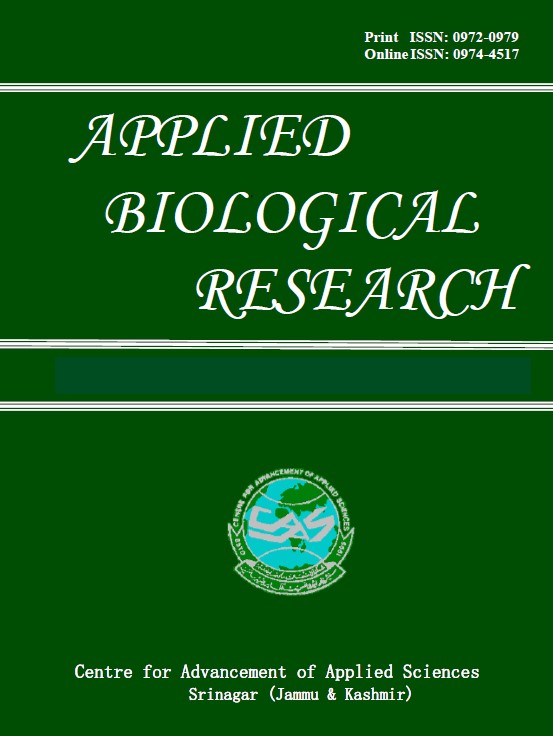Isolation And Antibiogram Of Escherichia Coli From Backyard Poultry In West Bengal (India)
DOI:
https://doi.org/10.48165/Keywords:
Isolation And Antibiogram, Escherichia, West BengalAbstract
Poultry industry is one of the promising industries of West Bengal (India) exhibiting annual growth rate of 15.4% since last 5 years. West Bengal state stands 2nd in relation to poultry population and 1st with respect to human population density in India (FAO, 2008). However, the State stands 5th in egg production due to large number of low yielding fowl population, about 84% of which are produced in backyard farming system (Animal Resources Development Department, 2010). ‘Deshi’ hens contribute 50% to egg production and the rest is from duck. The average productivity of backyard fowl population in the State is about 99 eggs in a year (Animal Resources Development Department, 2010). Microbial infection present within the flock in any form is one of the major constraints in optimum egg production. Escherichia coli is one of the common microbial flora of gastrointestinal tract of poultry and human being but may be pathogenic to both (Jawetz et al., 1984). Besides E. coli, colibacillosis in poultry is of great zoonotic importance as poultry meat is the common source of animal protein in India. In addition, the bacterial isolates of poultry or its products are the major source of antimicrobial resistance gene that can be horizontally transferred into other bacteria present in the environment (Guerra et al., 2003). The infection of animals or human with such kind of resistant bacteria makes the treatment difficult. In this background the present investigation was envisaged to know the prevalence of E. coli along with their antibiotic resistance pattern in the backyard chickens of West Bengal.
Downloads
References
Animal Resources Development Department. 2010 Annual Report. Animal Resources Development Department, Government of West Bengal. Kolkata, West Bengal, India.
Bauer, A.W., Kirby, W.M., Sherris, J.C. and Truck, M. 1966. Antibiotic susceptibility testing by a standardized single disk method. American Journal of Clinical Pathology, 45:493-496.
Palas Das et al.
Biswas, S. 2003. Isolation and Characterization of Aerobic Bacteria from Omphalitis in Chicks with Special Reference to Pathogenicity and Antibiogram of the Significant Isolates. M.V.Sc. thesis submitted to West Bengal University of Animal and Fishery Sciences, Kolkata, West Bengal, India.
Corbett, W.T., Berkhoff, H.A. and Vinal, A.C. 1987. Epidemiological study of the relationship between Congo red binding Escherichia coli and colisepticaemia. Canadian Journal of Veterinary Research, 51: 312-315.
FAO. 2008. Poultry Sector Country Review. Food and Agricultural Organization of the United Nations, Rome, Italy.
Goswami, P., Hui, A.K., Das, R., Chakraborty, A. and Ray, N. 2002. Isolation, identification and antibiogram of Escherichia coli from poultry in field condition. Journal of Interacademicia, 6: 680-683.
Guerra, B., Ernst, J., Schroeter, A., Malorny, B., Lehmann, S. and Helmuth, R. 2003. Phenotypic and genotypic characterization of antimicrobial resistance in German Escherichia coli isolates from cattle, swine and poultry. Journal of Antimicrobial Chemotherapy, 52: 489-492.
Hui, A.K. and Das, R. 2000. Prevalence of Escherichia coli in duck in two districts of West Bengal with their serotyping and antibiogram. Indian Journal of Animal Health, 39: 61-64. Ishiguro, E.E., Ainsworth, T., Trust, T.J. and Kay, W.W. 1985. Congo red agar, a differential medium for Aeromonas salmonicida detects the presence of cell surface protein array involved in virulence. Journal of Bacteriology, 164: 1233-1237.
Jawetz, E., Melnick, J. and Adelberg E.A. 1984. Review of Medical Microbiology (16th edn.), Long Medical Publication, Los Altos, California, USA.
Quinn, P.J., Carter, M.E., Markey, B.K. and Carter, G.R. 1994. Clinical Veterinary Microbiology, Wolfe Publications, London, UK.
Sharda, R., Wielfred, R. and Thyageeswaran, M. 2010. Isolation, characterization and antibiotic resistance pattern of Escherichia coli isolated from poultry. American Eurasian Journal of Scientific Research, 5: 18-22.
Usha Devi. 1998. Diseased and Apparently Healthy Poultry Birds with particular reference to their Serotyping, Antibiogram and Pathogenicity. M.V.Sc. thesis submitted to West Bengal University of Animal and Fishery Sciences, Kolkata, West Bengal, India.
Wani, S.A., Bhat, M.A. and Samanta, I. 2004. In vitro drug sensitivity profile and characterization of Escherichia coli from diarrhoeic chicken in Kashmir valley. Indian Journal of Animal Sciences, 74: 818-821.

